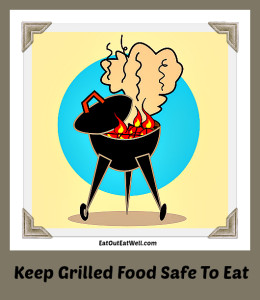Ah! Warm weather! Picnics and barbecues! Awesome grilled food!
Whoops! Picnics, barbecues, and grilling can create the perfect environment for the bacteria that already reside in food to rapidly multiply and become the cause of a foodborne illness.
It’s really important to follow safe food handling rules when you’re cooking perishable foods like meat, poultry, seafood, and eggs and Unfortunately, it’s way too easy to get a little lax about following food handling rules when the grill takes center stage.
Here are some grilling guidelines:
- Always wash your hands with soap and water before and after you handle the food. Did you pick up the raw burger or the piece of fish or chicken with your fingers to put it on the grill?
- When you marinate your food, let the food sit in the marinade in the refrigerator — not on the counter — or worse, out in the sun next to the grill. Don’t use the marinade that the raw meat or poultry sat in on the cooked food. Instead, reserve part of the unused marinade to baste with or to use as a sauce.
- Get those coals hot. Preheat the coals on your grill for 20 to 30 minutes, or until the coals are lightly coated with ash. If you’re using a gas grill, turn on the grill so it has enough time to thoroughly heat up.
- Use a food thermometer (make sure you have one at home and one to pack for grilling at picnics) to be certain that the food reaches a safe internal temperature. The FDA recommends:
- Steaks and Roasts: 145 degrees F (medium rare), 160 degrees F (medium)
- Fish: 145 degrees F
- Pork: 145 degrees F
- Ground beef: 160 degrees F
- Egg dishes: 160 degrees F
- Chicken breasts: 165 degrees F
- Whole poultry: 165 degrees F
- Shrimp, lobster, and crabs: cook until pearly and opaque
- Clams, oysters, and mussels: cook until the shells are open
- When the food is cooked, don’t put it on the same platter that you used to carry the raw food out to the grill, or the same tongs or spatula, either – unless they’ve been washed first in hot, soapy water.
- Reusing without washing can spread bacteria from the raw juices to your cooked or ready-to-eat food. Better yet, bring a clean platter and utensils with you to the grill and remove the ones that the raw food has been on – it’s too easy to mistakenly reuse the raw food ones.
- When grilled food is “ready” keep it hot until it’s served by moving it to the side of the grill rack, just away from the coals — or the burner if you’re using gas. This will keep it hot but prevent it from overcooking.
- If you reheat food, make sure it reaches 165°F.
- Cook only the amount of food that you think people will eat. It’s easy to cook more, but it’s a challenge to keep leftovers at a safe temperature. Throw out any leftovers that haven’t stayed within the safe temperature range.

